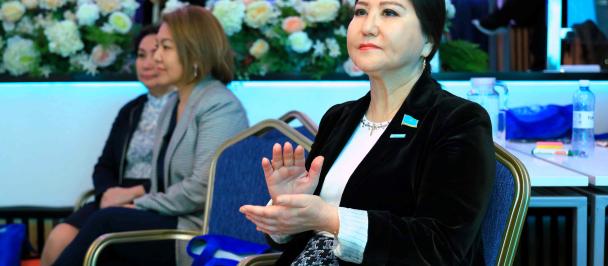UNDP Deputy Resident Representative’s speech at the Parliamentary Commission meeting on monitoring the implementation of Sustainable Development Goals
October 15, 2024

Esteemed Mr. Ashimbayev, Chairman of the Senate,
Honorable Ministers,
Esteemed Members of Parliament and Government!
Allow me to begin my speech with a key idea: gender equality is not just a matter of human rights, but a question of social justice, ensuring equal access to rights, resources, and opportunities for all. The symbolic opening of a new cycle of work by the Parliamentary Commission discussing this important topic serves as a vivid confirmation of the country’s commitment to achieving Sustainable Development Goal 5: Gender Equality.
Just a month ago, at the Future Summit, UN Secretary-General António Guterres emphasized in his address to world leaders that “21st century challenges require 21st century solutions: frameworks that are networked and inclusive; and that draw on the expertise of all of humanity”.
Despite the successes achieved, it is evident that progress toward achieving SDG 5 remains insufficient for its full realization within the established timelines. Currently, Kazakhstan ranks 66th out of 166 countries in the Global SDG Index, with SDG 5 demonstrating stagnation, as progress is moving at half the necessary pace.
Moreover, of the 16 national indicators for SDG 5, none are currently included in the relevant list. For several key indicators, such as monitoring government expenditures aimed at ensuring gender equality, the methodology at the national level has still not been adapted. Without reliable, disaggregated data to track progress, it is nearly impossible to ensure the effectiveness and impact of our efforts to achieve gender equality.
SDG 5 is a cross-cutting goal, so identifying and tracking interconnections with other SDGs is also extremely important. The indicators of SDG 5 significantly influence the achievement of, and are closely interconnected with, over 106 other indicators and more than 50 targets of the SDGs. For example, addressing the issue of unpaid care work has a substantial impact on early childhood development in the context of SDG 4, while simultaneously contributing to reducing unemployment under SDG 8.
Considering these interconnections allows for the formulation of more comprehensive policies and the development of effective measures to simultaneously accelerate progress in multiple areas.
In recent years, there has been a positive trend in the education levels of men and women; however, there has been no systematic improvement in the political representation of women or their participation in the workforce. The share of women in parliament currently stands at only 18.9 percent, indicating a significant regression to levels not seen in the past 13 years. Women’s participation in the labour market is only 66 percent compared to 73.5 percent for men. It is important to highlight those high-income sectors, such as ICT and the green economy, are among the critical areas where temporary special measures are needed to combat gender segregation in the labour market. Women’s participation in these sectors is extremely low. According to statistics from 2023, women made up only 15 percent of the total employed in renewable energy projects.
In this context, I fully support your position regarding the need for systemic measures to combat harmful social norms. According to a UNDP study from 2024, 54 percent of citizens in Kazakhstan believe that a career in STEM is not suitable for women. This view is supported by real facts: only 8–15 percent of women are studying engineering programs at universities. Increasing women's participation in these fields can engage a broader talent pool, stimulating innovation and strengthening the economy.
Generally, women work in non-manufacturing sectors with low added value. Traditionally, women make up a significant portion of wholesale and retail trade and other sectors, where their participation nearly doubles that of men (57.3 percent compared to 34 percent). This makes women working in the SME sector more vulnerable to economic fluctuations and downturns.
There are also conditions that contribute to the economic vulnerability of women in rural areas. In 2022, 93 percent of women in rural areas reported working less than 40 hours a week due to caregiving responsibilities, which limits their participation in the labour force and hinders career growth. Special measures are needed to engage rural women in the economy and entrepreneurship, as they face serious challenges in accessing financial resources and collateral for loans, not to mention the additional burden of unpaid domestic work.
To assist Kazakhstan in accelerating progress towards achieving SDG 5, UNDP, in collaboration with the Ministry of Culture and Information, launched a Certification Programme for Achieving Gender Equality for public institutions. This programme acts as an accelerator for organizations to achieve their gender equality goals.
The programme evaluates current practices and adjusts the direction of gender policy implementation for organizations of various profiles. Moreover, the programme is included in the recently adopted Government Plan through 2027.
We believe this will foster a culture of gender accountability and help Kazakhstan fulfill its commitments under international conventions.
Esteemed participants of the session,
More attention needs to be given to the consideration and integration of gender equality issues into key strategic planning documents of the country. Unfortunately, the recently adopted National Development Plan for Kazakhstan through 2029 did not encompass the issues of implementing gender-sensitive governance and budgeting principles, as well as expanding women's economic opportunities.
This may be a significant oversight, but it also creates additional opportunities for collaboration and partnership. We view this process as inclusive, where we can jointly improve approaches to integrating gender-sensitive elements into national policies and develop more comprehensive and effective measures. Progress in this direction will not only address the aforementioned problems but also change social norms in society and foster a proper understanding of gender equality.
Thank you very much.

 Locations
Locations


